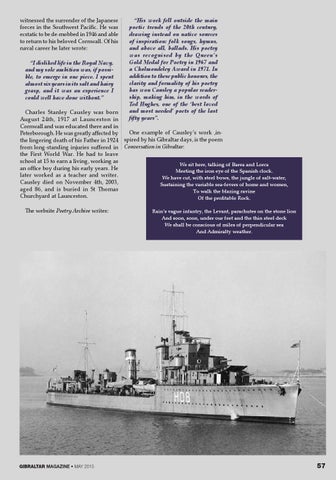witnessed the surrender of the Japanese forces in the Southwest Pacific. He was ecstatic to be de-mobbed in 1946 and able to return to his beloved Cornwall. Of his naval career he later wrote: “I disliked life in the Royal Navy, and my sole ambition was, if possible, to emerge in one piece. I spent almost six years in its salt and hairy grasp, and it was an experience I could well have done without.”
“His work fell outside the main poetic trends of the 20th century, drawing instead on native sources of inspiration: folk songs, hymns, and above all, ballads. His poetry was recognised by the Queen’s Gold Medal for Poetry in 1967 and a Cholmondeley Award in 1971. In addition to these public honours, the clarity and formality of his poetry has won Causley a popular readership, making him, in the words of Ted Hughes, one of the ‘best loved and most needed’ poets of the last fifty years”.
Charles Stanley Causley was born August 24th, 1917 at Launceston in Cornwall and was educated there and in One example of Causley’s work ,inPeterborough. He was greatly affected by the lingering death of his Father in 1924 spired by his Gibraltar days, is the poem from long-standing injuries suffered in Conversation in Gibraltar: the First World War. He had to leave school at 15 to earn a living, working as We sit here, talking of Barea and Lorca an office boy during his early years. He Meeting the iron eye of the Spanish clock. later worked as a teacher and writer. We have cut, with steel bows, the jungle of salt-water, Causley died on November 4th, 2003, Sustaining the variable sea-fevers of home and women, aged 86, and is buried in St Thomas To walk the blazing ravine Churchyard at Launceston. Of the profitable Rock. The website Poetry Archive writes:
GIBRALTAR MAGAZINE • MAY 2015
Rain’s vague infantry, the Levant, parachutes on the stone lion And soon, soon, under our feet and the thin steel deck We shall be conscious of miles of perpendicular sea And Admiralty weather.
57
